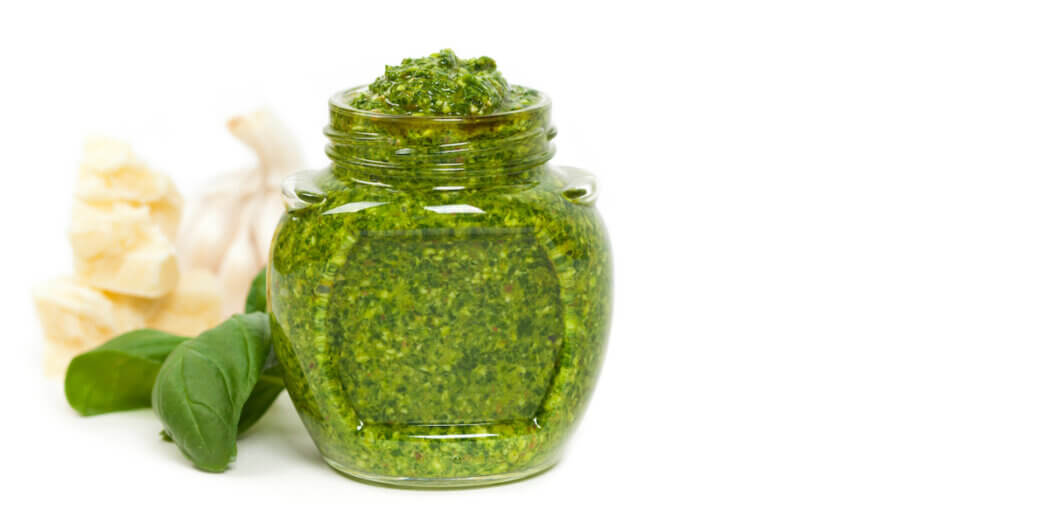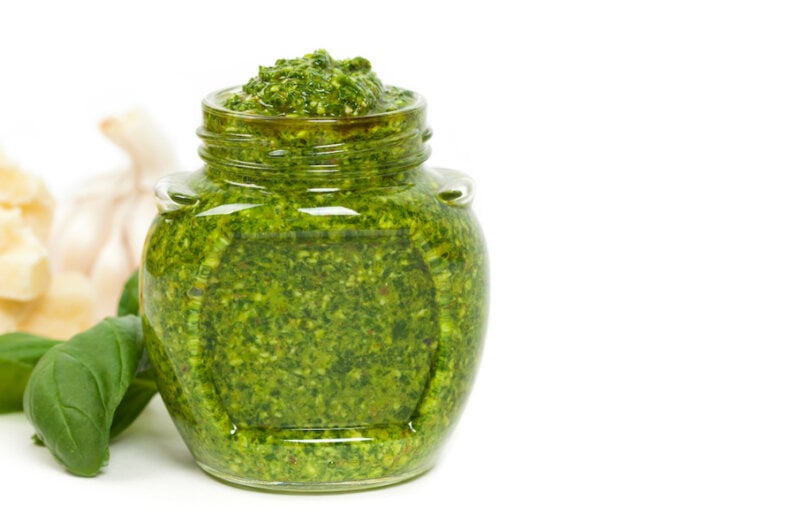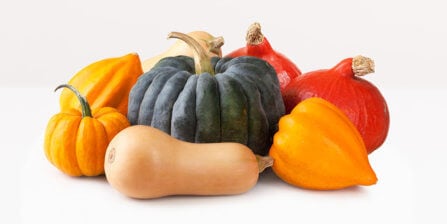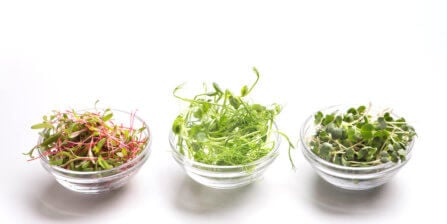Grocery Guides
Pesto – All You Need to Know | Instacart’s Guide to Groceries

What is pesto?
Pesto is a thick sauce that is a vibrant green color. Traditionally, pesto sauce is made with basil leaves, garlic, olive oil, pine nuts, salt, and a hard cheese such as Parmigiano Reggiano or Pecorino Sardo. These ingredients are blended together to create a bright, herby sauce that goes great with proteins, pasta, or smothered on sandwiches or pizza.
Where did pesto originate from?
Some may be surprised to learn that pesto’s full name is actually pesto alla Genovese. Pesto originates from Genoa, Italy. In the Genoese language, the word “pesto” is the past tense form of the word “pestare” which is translated into “to crush.” This makes perfect sense when traditionally, the ingredients in pesto were crushed by hand, coincidentally using a mortar and pestle.
What to look for when buying pesto
If you are making pesto from scratch, make sure that all your ingredients are fresh. The fresher your ingredients, the more fragrant and savory your pesto will taste.
If you are buying your pesto from your local grocery store, there are many tasty store-bought pesto options. When buying pesto, make sure to check the “Best By” or expiration date to ensure you purchase items that are at their peak freshness.
Pesto is made with an abundant amount of olive oil. You can usually see a layer of olive oil resting on the surface of the pesto. This is both normal and ideal as your pesto should have a fair amount of oil and should not be dry. Because pesto recipes can greatly vary, make sure to scan the ingredients list to make sure your pesto includes all the ingredients and flavors that you personally prefer.
Grab it now on Instacart:
How to store pesto
If you purchased pesto from the store, read the directions on the package label to determine if you need to store the pesto in the fridge or on a shelf. Some jarred pesto can be stored on a shelf in a cool, dark, and dry area like a pantry or cupboard. However, once you open the jar, store any leftover pesto in the refrigerator.
How to tell if pesto is bad
Homemade pesto will typically last for 5-7 days in the fridge, while store-bought jarred or refrigerated pesto sauces will often last one to two weeks in the fridge.
Regardless of whether you made fresh pesto or bought pre-packaged pesto, when exposed to air, the pesto will eventually start to brown in color. The upper surface that is not submerged in olive oil will usually begin to change color first. When you notice that the leaves and olive oil are brown, it is best to dispose of your pesto as the flavor and freshness are compromised.
What can I substitute for pesto?
If you are looking to make pesto from scratch and would like to substitute some of the traditional ingredients, here are some ways to modify your pesto recipe to your liking.
Substitutes for pine nuts
Pine nuts can be slightly pricier and more difficult to find in comparison to other nuts. If you need to substitute the traditional pine nuts in your pesto recipe, you can incorporate other nut varieties like almonds or walnuts. Other non-traditional but equally tasty options are hazelnuts, pistachios, pecans, macadamia nuts, or sunflower seeds.
Substitutes for basil
You can use substitutes for traditional basil. You can still create homemade pesto utilizing fresh ingredients like spinach, arugula, cilantro, parsley, or mint. For more unique alternatives, try incorporating sage, baby chard, carrot tops, sorrel, or blanched kale.
Substitutes for parmesan cheese
If you don’t have parmesan cheese, you can still make pesto using other cheese varieties like Pecorino Romano, asiago, aged manchego, or any other hard, salty cheeses. If you want to opt-out of dairy altogether and create a vegan pesto, try swapping out the cheese for nutritional yeast.
Types of pesto
With the rise of food allergies along with culinary creativity in the kitchen, there is a wide scope of savory pesto options for you to discover and utilize in your next dish.
- Classic pesto: The tried-and-true pesto recipe traditionally uses basil, pine nuts, olive oil, cheese, and garlic. Shop classic pesto.
- Red pesto: You can find red pesto varieties that commonly use tomatoes (fresh or sun-dried). Shop red pesto.
- Pistachio pesto: Not into the classic recipe using pine nuts? Pistachios are a unique and delicious substitute. Shop pistachio pesto.
- Artichoke pesto: Searching for a surprising twist on traditional pesto? Try out a pesto with an out-of-the-ordinary ingredient like artichoke. Shop artichoke pesto.
- Vegan pesto: The classic pesto recipe calls for cheese, but if dairy is on your no-no list, try out vegan alternatives. Shop vegan pesto.
Start cooking with pesto
Because of its popularity, pesto sauces are widely available at grocery stores, but if you want to save time, you can easily shop for pesto via Instacart. After adding a product to your cart, use the “Instructions” option to notify your Instacart shopper about any preferences or specific directions on how to choose the best products and decide if you want your groceries delivered or if you want to pick them up curbside.
How to Make Fresh Pesto
Course: Grocery GuidesCuisine: ItalianDifficulty: Easy4
servings10
minutes15
minutes260
kcalLooking to make your own pesto? Use this classic pesto recipe as your base, or jazz it up with other complementary ingredients.
Ingredients
2 cups of fresh basil leaves (approximately from 2 bunches)
1/2 cup pine nuts
2 peeled garlic cloves
1/4 cup finely grated parmesan cheese
1/2 cup extra-virgin olive oil
Salt to taste
Directions
- In a food processor or blender, pulse pine nuts until a smooth paste forms.
- Add in the garlic cloves and pulse until garlic is fully incorporated and paste is smooth.
- Add the basil and a pinch of salt and pulse a few times. Pulse until a bright green paste forms.
- Remove from blender and stir in cheese and oil.
- Add salt to taste.
Most Recent in Grocery Guides

Grocery Guides
Guide to Sustainable Grocery Delivery
Who has time for the grocery store these days? Between work, family and everything else, it feels like a chore we could all do without. That's where sustainable grocery delivery comes in! You get the…
Feb 7, 2025
Grocery Guides
19 Best Milk Substitutes for Baking and Cooking
Milk’s rich texture and neutral flavor make it a staple in countless recipes, bringing creaminess and balance to sweet and savory dishes alike. But what happens if you run out of milk or need a…
Jan 30, 2025
Grocery Guides
15 Best Cheeses for Your Next Charcuterie Board
Let’s face it: The heyday of the store-bought party platter is long gone. Now, the duties of a good host often include curating an impressive charcuterie board. But where do you begin? Charcuterie boards typically…
Jan 21, 2025








 Squash – All You Need to Know | Instacart Guide to Fresh Produce
Squash – All You Need to Know | Instacart Guide to Fresh Produce  Ghost Pepper – All You Need to Know | Instacart Guide to Fresh Produce
Ghost Pepper – All You Need to Know | Instacart Guide to Fresh Produce  Sprouts – All You Need to Know | Instacart Guide to Fresh Produce
Sprouts – All You Need to Know | Instacart Guide to Fresh Produce 

